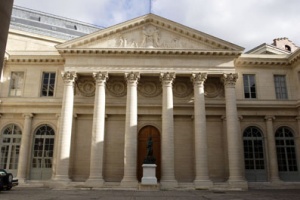Difference between revisions of "Language/French/Culture/Education"
| Line 38: | Line 38: | ||
===The baccalauréat=== | ===The baccalauréat=== | ||
The baccalauréat is a unitary exam, that students either pass or fail. It is impossible to pass in one subject and fail in another ones. The only mark that counts is the final weighted average, which must be at least 10/20 for a student to pass. | The baccalauréat is a unitary exam, that students either pass or fail. It is impossible to pass in one subject and fail in another ones. The only mark that counts is the final weighted average, which must be at least 10/20 for a student to pass. | ||
The students pass this exam at the final year of high school. The student pass a test on history/geography, mathematics, French, English, sport, philosophy and chemical Physics ( if you choose " terminale S ") or Economics ( if you choose "terminale ES "). It is necessary to go to university. | The students pass this exam at the final year of high school. The student pass a test on history/geography, mathematics, French, English, sport, philosophy and chemical Physics (if you choose " terminale S ") or Economics (if you choose "terminale ES"). It is necessary to go to university. | ||
===Grading=== | ===Grading=== | ||
Revision as of 11:24, 9 November 2019
The French educational system is said to be one of the most successful in the world. Education is compulsory in France from the age of 6 to 16, but a large majority of children often start school at the age of 2.
Basically, the French education system starts with kindergarten (l'école maternelle), then the elementary or primary school (l'école primaire), the middle school (le collège), high school (le lycée) and the college (l'université).
Warning: the words Collège in English and College in French are false friends!
Ecole Maternelle (kindergarten)
Ecoles Maternelles (kindergarten) take pupils from the age of 2 to 6 and prepare them for the entry to a primary school.
It traditionally has 3 or 4 classes:
- la petite section (PS), (the small section)
- la moyenne section (MS), (the medium section)
- la grande section (GS), (the large section),
- and sometimes also une toute petite section (TPS) (the very small section) for children under 3 years.
Ecole primaire (primary school)
There are 5 levels (ages 6 to 11):
- Cours préparatoire (CP) or 11ème – age 6 to 7 years old
- Cours élémentaire (CE1) or 10ème – age 7 to 8 years old
- Cours élémentaire (CE2) or 9ème – age 8 to 9 years old
- Cours moyen 1 (CM1) or 8ème – 9 to 10 years old
- Cours moyen 2 (CM2) or 7ème – 10 to 11 years old
Collège (Middle school)
There are four levels, normally for pupils aged 11 - 15. The four classes, corresponding to grades 6 to 9, are called sixième, cinquième, quatrième and troisième. En troisième which is year 9, the pupils pass a test on history/geography, mathematics, French and art history. It is their first important diploma to certify what you learned in middle school.
Lycée (High School)
The traditional French lycée covers the last three years of secondary education. There are two main types of traditional lycée, the lycée général or lycée classique, and the lycée technique.
The main function of the lycée is to prepare pupils to take the "baccalauréat" (or "bac") exam. The three classes (grades 10 to 12) are known as seconde, première and terminale.
The baccalauréat
The baccalauréat is a unitary exam, that students either pass or fail. It is impossible to pass in one subject and fail in another ones. The only mark that counts is the final weighted average, which must be at least 10/20 for a student to pass. The students pass this exam at the final year of high school. The student pass a test on history/geography, mathematics, French, English, sport, philosophy and chemical Physics (if you choose " terminale S ") or Economics (if you choose "terminale ES"). It is necessary to go to university.
Grading
Grading in the French education system is standardized. All marks or grades are out of twenty, and the pass mark is assign to those who have at least 10/20.
France has a dual university system : the "Universités" and the "Grandes Ecoles".
Universités
France has 82 state universities and 5 Catholic universities and a large number of private "institutes". The traditional system in the French universities is based on the LMD system : Licence (3 years), Master (2 years) and Doctorate (3 years) In French universities, you can study various fields of study from foreign languages to business but also medecine, science, computer science, arts, law, psychology, sociology, history, and many others
Grandes Ecoles
After High School, the best students can apply to "Classes préparatoires" to prepare themselves within 2 or 3 years for the "Grandes Ecoles" : Ecoles d'Ingénieurs (Sciences), Business Schools and ENS (Ecole Normale Supérieure).
Please do not hesitate to edit this article if you think it needs improvements.
